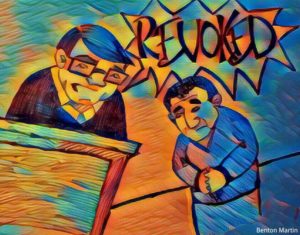Supervised Release Cannot Be Revoked After Supervision Term Ends
Anthony Holman's supervised release was revoked for failing to pay restitution and picking up a new charge. However, the violation petition was not submitted until after Holman’s term of supervision had already expired. No summons was pending at the time either. Generally, whenever a U.S. Probation Officer believes that a defendant has violated his or her supervised release, a violation petition will be submitted to the Court. The petition can request that no action be taken, that a summons for the defendant's appearance be issued, or that an arrest warrant be filed. The U.S. Court of Appeals DC Circuit reversed and vacated the revocation for lack of jurisdiction. The expiration of a term of supervised release can be tolled under 18 U.S.C. § 3583(i).
That statute provides:
(i) Delayed Revocation.—
The power of the court to revoke a term of supervised release for violation of a condition of supervised release, and to order the defendant to serve a term of imprisonment and, subject to the limitations in subsection (h), a further term of supervised release, extends beyond the expiration of the term of supervised release for any period reasonably necessary for the adjudication of matters arising before its expiration if, before its expiration, a warrant or summons has been issued on the basis of an allegation of such a violation. 18 U.S.C. § 3583(i).

Supervised Release
However, because no summons was issued for the alleged violations prior to the expiration of Holman’s supervision, the district court could not rely on § 3583(i) to support jurisdiction over the revocation, the court held.
The appeals court also rejected the Government’s argument that Holman’s failure to pay restitution amounted to an “ongoing” violation. The court held that Holman paid what he could when he was working and that no evidence existed which showed a “willful” failure to pay.
United States v. Holman, 16-3107 ( U.S. Court of Appeals - DC Circuit 2017).
Featured image by: Benton Martin (Own work) [CC BY-SA 4.0 (http://creativecommons.org/licenses/by-sa/4.0) , via Wikimedia Commons courts.
Recommended for you
Ex Parte Communications By Judge With Jury Required Reversal Of Convictions
At Martin Bradley III’s trial for racketeering, mail fraud, wire fraud, and money laundering, the district court had two ex parte communications with the jury. Bradley’s defense lawyers did not become aware of notes until after his appeal. Bradley filed a 2255 motion arguing, in addition to other things, that the court had violated Rule…
Burrage Applies Retroactively To Cases On Collateral Review
In Burrage v. United States, 134 S. Ct. 881 (2014), the Supreme Court held that “at least where use of the drug distributed by the defendant is not an independently sufficient cause of the victim’s death or serious bodily injury, a defendant cannot be liable under the penalty enhancement provision of 21 U.S.C. § 841(b)(1)(C)…
Child Pornography Sentence Improper Because Judge Treated Guidelines As Binding
Child Pornography is considered one of the serious crimes in sentencing. Roy Perry was sentenced to 151 months for receipt of child pornography. At sentencing, the court stated “I’m probably going to give him a Guideline sentence because it would be really an act of, I don’t know what you call it, defiance, maybe not,…



